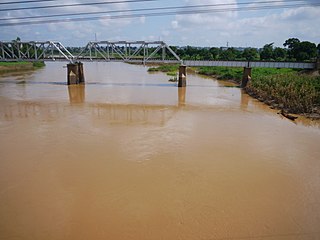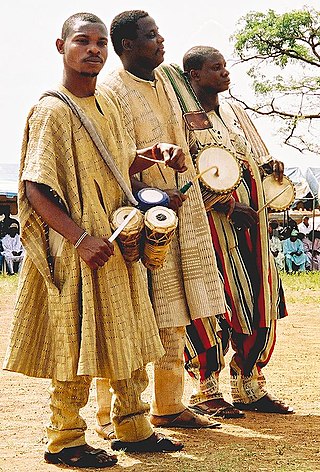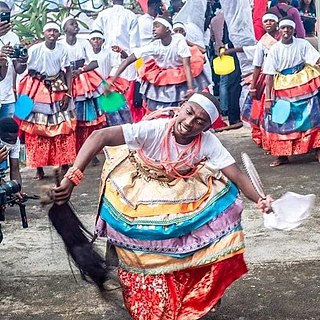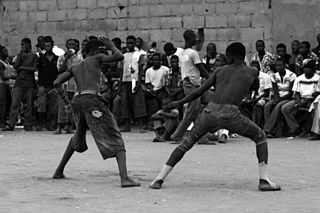Martial arts
Dambe
Kokawa

Nigeria has several traditional games, though they have faded away due to lack of support and the dominance of Western sports. [1] Traditional games historically played a significant role in teaching Nigerian children about the structure of their societies. [2]
Several traditional Nigerian games are played at the National Sports Festival of Nigeria. [3]
Abula is similar to volleyball, except that participants hit the ball with a wooden bat. [4] [5]
After singing a song with the opening line "after round one", players have to display a number from one to five using their fingers; the person who displays the lowest numbers of fingers has their palm slapped by all the other participants. [6] [7]
Langa is played in rounds; in each round, one player from each team, known as the Ruwa (point-scorer), attempts to reach a designated area on the opponent's side in order to score a point for their team. The Ruwas and all other players have to hop on one foot, while holding their other foot with one hand. If a player's hand is dislodged from their held foot by an opponent, then they are eliminated from that round. [8] [9]
Two participants stand opposing each other, and then lift one of their legs up; if a player lifts the same leg up as the opponent, then the opponent wins a point. [10]
Kpokoro is a version of Ten Ten which involves multiple players, and also resembles follow the leader. [11]
Ayo (Yoruba: Ayò Ọlọ́pọ́n) is a traditional mancala played by the Yoruba people in Nigeria. It is very close to the Oware game that spread to the Americas with the atlantic slave trade. Among modern mancalas, which are most often derived from Warri, the Kalah is a notable one that has essentially the same rules as Ayo.
There are games with identical rules also in other areas of Africa. One such game is the Endodoi, played by the Maasai people of Kenya and Tanzania.Arin is similar to billiards, except that it is played using seeds as the items that are maneuvered around. [12] [13]


Mancala refers to a family of two-player turn-based strategy board games played with small stones, beans, or seeds and rows of holes or pits in the earth, a board or other playing surface. The objective is usually to capture all or some set of the opponent's pieces.

The music of Nigeria includes many kinds of folk and popular music. Little of the country's music history prior to European contact has been preserved, although bronze carvings dating back to the 16th and 17th centuries have been found depicting musicians and their instruments. The country's most internationally renowned genres are Indigenous, Apala, Aurrebbe music, Rara music, Were music, Ogene, Fuji, Jùjú, Afrobeat, Afrobeats, Igbo highlife, Afro-juju, Waka, Igbo rap, Gospel, and Yo-pop. Styles of folk music are related to the over 250 ethnic groups in the country, each with their own techniques, instruments, and songs. The largest ethnic groups are the Igbo, Hausa and Yoruba. Traditional music from Nigeria and throughout Africa is often functional; in other words, it is performed to mark a ritual such as the wedding or funeral and not to achieve artistic goals. Although some Nigerians, especially children and the elderly, play instruments for their own amusement, solo performance is otherwise rare. Music is closely linked to agriculture, and there are restrictions on, for example, which instruments can be played during different parts of the planting season.

Oware is an abstract strategy game among the mancala family of board games played worldwide with slight variations as to the layout of the game, number of players and strategy of play. Its origin is uncertain but it is widely believed to be of Ashanti origin.
Baraladei Daniel Igali is a Nigerian-Canadian wrestler. He won Canada's first ever Olympic gold medal in wrestling at the 2000 Summer Olympics and remains Canada's only male Olympic gold medalist in wrestling.

The Kaduna River is a tributary of the Niger River which flows for 550 kilometres (340 mi) through Nigeria. It got its name from the crocodiles that lived in the river and surrounding area. Kaduna in the native dialect, Hausa, was the word for "crocodiles". It starts in Plateau State on the Jos Plateau 29 kilometres (18 mi) southwest of Jos town, flows through its namesake Kaduna State and through its capital Kaduna, and meets the Niger River in Niger State. Most of its course passes through open savanna woodland, but its lower section has cut several gorges above its entrance into the extensive Niger floodplains. The river is used for fishing and transport of local produce.

The culture of Nigeria is shaped by Nigeria's multiple ethnic groups. The country has 527 languages, seven of which are extinct. Nigeria also has over 1,150 dialects and ethnic groups. The three largest ethnic groups are the Hausas that are predominantly in the north, the Yorubas who predominate in the southwest, and the Igbos in the southeast. There are many other ethnic groups with sizeable populations across the different parts of the country. The Kanuri people are located in the northeast part of Nigeria, the Tiv people of north central and the Efik-Ibibio are in the south South. The Bini people are most frequent in the region between Yorubaland and Igboland.

Yoruba music is the pattern/style of music practiced by the Yoruba people of Nigeria, Togo, and Benin. It is perhaps best known for its extremely advanced drumming tradition and techniques, especially using the gongon hourglass shape tension drums. Yoruba folk music became perhaps the most prominent kind of West African music in Afro-Latin and Caribbean musical styles; it left an especially important influence on the music used in Santería practice and the music of Cuba.

The Itsekiri are one of the Yoruboid subgroup of Nigeria's Niger Delta area, They speak a Yoruboid language and can be found in Delta State. The Itsekiris presently number 1 million people and live mainly in the Warri South, Warri North and Warri South West local government districts of Delta State on the Atlantic coast of Nigeria.

A folk wrestling style is any traditional style of wrestling, which may or may not be codified as a modern sport. Most cultures have developed regional forms of grappling.

Dambe is a martial art of the Hausa people from Nigeria. Competitors in a typical match aim to subdue each other into total submission mostly within three rounds. It often results in serious bodily injury. Boxers are called by the Hausa word "daæmaænga".
The interjection Ayo! is a common variation of the word Yo!.

The Hausa are a native ethnic group in West Africa. They speak the Hausa language, which is the second most spoken language after Arabic in the Afro-Asiatic language family. The Hausa are a culturally homogeneous people based primarily in the Sahelian and the sparse savanna areas of southern Niger and northern Nigeria respectively, numbering around 86 million people, with significant populations in Benin, Cameroon, Ivory Coast, Chad, Central African Republic, Togo, Ghana, as well as smaller populations in Sudan, Eritrea, Equatorial Guinea, Gabon, Senegal, Gambia. Predominantly Hausa-speaking communities are scattered throughout West Africa and on the traditional Hajj route north and east traversing the Sahara, with an especially large population in and around the town of Agadez. Other Hausa have also moved to large coastal cities in the region such as Lagos, Port Harcourt, Accra, Abidjan, Banjul and Cotonou as well as to parts of North Africa such as Libya over the course of the last 500 years. The Hausa traditionally live in small villages as well as in precolonial towns and cities where they grow crops, raise livestock including cattle as well as engage in trade, both local and long distance across Africa. They speak the Hausa language, an Afro-Asiatic language of the Chadic group. The Hausa aristocracy had historically developed an equestrian based culture. Still a status symbol of the traditional nobility in Hausa society, the horse still features in the Eid day celebrations, known as Ranar Sallah. Daura is the cultural center of the Hausa people. The town predates all the other major Hausa towns in tradition and culture.

Senegalese wrestling is a type of folk wrestling traditionally performed by the Serer people and now a national sport in Senegal and parts of The Gambia, and is part of a larger West African form of traditional wrestling. The Senegalese form traditionally allows blows with the hands (frappe), the only one of the West African traditions to do so. As a larger confederation and championship around Lutte Traditionnelle has developed since the 1990s, Senegalese fighters now practice both forms, called officially Lutte Traditionnelle sans frappe and Lutte Traditionnelle avec frappe for the striking version.

Lutte Traditionnelle is a style of West African folk wrestling, known as Laamb in Senegal, Boreh in The Gambia, Evala in Togo, and KoKowa / Kokawa in Hausa areas of Nigeria and Niger, or simply Lutte Traditionnelle, in Niger and Burkina Faso. International competition takes place during the Jeux de la Francophonie and the newly organised Championship of African Lutte Traditionnelle.

Ayo is a traditional mancala played by the Yoruba people in Nigeria. It is very close to the Oware game that spread to the Americas with the atlantic slave trade. Among modern mancalas, which are most often derived from Warri, the Kalah is a notable one that has essentially the same rules as Ayo.
Guosa is a constructed interlanguage originally created by Alex Igbineweka in 1965. It was designed to be a combination of the indigenous languages of Nigeria and to serve as a lingua franca to West Africa.
Odo Ere, popularly called Ere Gajo, is the headquarters of Yagba West Local Government Area, Kogi State, Nigeria. The town is located in the old Kabba Province about 140 kilometres southeast of Ilorin. The people of Odo Ere share a common ancestry with the Yoruba people in South-West Nigeria and they are often referred to as Okun Yoruba people. The town is situated on a well-watered savannah plain consisting of dotted hills, forest and grassland. The topography earned the town the sobriquet: Ere Ọmọ Onilẹ Dun Rin, meaning "Odo Ere town with a beautiful flat terrain that enhances ease of movement".
Arinzo is a 2013 Nigerian film produced by Iyabo Ojo. Ghollywood and Nollywood actors were featured in the film, and it was shot in both Ghana and Nigeria.
Hausa Day, formally known #RanarHausa, is an annual cultural celebration observed on the 26th of August by the Hausa people, a prominent ethnic group found in West Africa. This day serves as an opportunity for the global Hausa community to come together and celebrate their rich cultural heritage, traditions, language, and history. World Hausa Day transcends national borders, uniting Hausa people from countries such as Nigeria, Niger, Chad, Ghana, Mali, Senegal, and other regions where the Hausa diaspora is present.